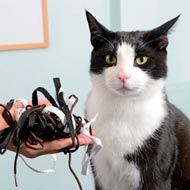
Vets shocked to discover a tangle of items in cat's stomach
Brighton vets got a shock when they performed exploratory surgery on a cat with a suspected tumour, only to find an assortment of shoelaces, hair bands and plastic in his stomach.
Curious cat Garry had been taken to PDSA's pet hospital in Brighton for his annual boosters, when vets became concerned by a large mass in his stomach. Garry's worried owner, Ana Barbosa, was told to expect the worst, as a life-threatening tumour was suspected to be the cause.
During emergency surgery, however, PDSA vet Jess Maguire discovered a tangle of objects in Garry's stomach. She commented: "We often see dogs who have eaten odd things, but it is quite unusual for a cat to eat so many different items."
Garry's owner said: "Garry is a very cheeky little chap who has always preferred playing with human things instead of cat toys. But we had no idea he was actually eating them.
"I’d washed some laces from my trainers, which went missing. I never for one moment thought that Garry was the reason why!
"When I first heard it may be a tumour, I was devastated. My two boys and I all adore him. So although I was absolutely shocked to find out what the mass was, we were relieved to hear the good news that it wasn’t a tumour."
The items could have caused a fatal blockage if left undetected. Vets suspect they had been eaten over a period of time and said it's surprising the cat had not suffered any symptoms.
Garry's owner said the mischievous moggie will be under close scrutiny now to put a stop to his bizarre snacking.
Image courtesy of PDSA



 The RCVS has announced a new version of its 1CPD mobile app, with enhanced features for veterinary surgeons and veterinary nurses to record their continuing professional development.
The RCVS has announced a new version of its 1CPD mobile app, with enhanced features for veterinary surgeons and veterinary nurses to record their continuing professional development.